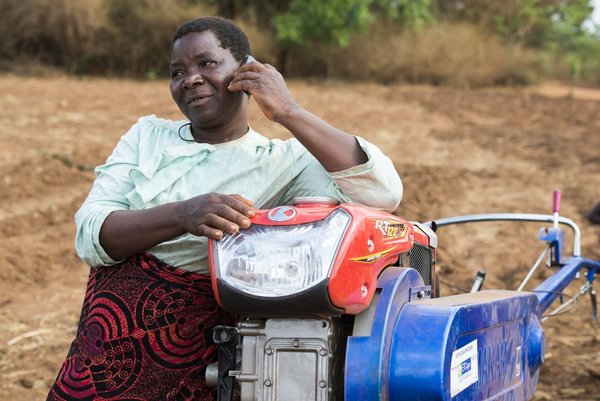 Read this article in French
Read this article in French- Share this article
- Subscribe to our newsletter
ONE WORLD no hunger – Green Innovation Centres tapping digital potential
Nowadays, with the aid of digital information and communications technology (ICT), smallholdings can be provided with special information and knowledge that they previously had no access to. Thanks to the cheap establishment and use of large amounts of data, farms become more productive and efficient. Thus digitisation has a considerable potential to raise agricultural productivity and, hence, income.
This is the starting point for the BMZ global programme “Green Innovation Centres in the Agriculture and Food Sector” (GIAE), with currently more than 30 different ICT instruments in 16 country packages. ICTs are applied throughout the entire value chain. They drive economic development and improve the integration of producers as well as micro-, small and medium-size enterprises into functioning markets. For this purpose, the Green Innovation Centres particularly seek digital ICT instruments which can eliminate bottlenecks in the value chains.
Successful ICT innovations are to be further developed and disseminated in the partner countries so that other GIAE country packages and more projects can benefit from them.
For example: “TroTro Tractor” in Ghana – tractors for everyone
A low level of mechanisation is a major factor limiting smallholder productivity in Ghana. Owing to the small size of farms, owning one’s own equipment usually does not pay its way. The Green Innovation Centre Ghana is addressing this aspect in cooperation with the Ghanaian start-up company TroTro Tractor by providing farmers with mechanisation services. Clients can order them with the aid of a digital app.
Contractors are often confronted with problems typical of the informal sector, which is characterised by smallholder structures. Obstacles include establishing contact with smallholders and handling payment.
The TroTro Tractor digital platform offers a solution allowing farmers to order a tractor with a simple SMS in which they state information such as the type of service required, their location and the site and size of their field. TroTro Tractor then puts the orders together and forwards them to the next available service provider. A special GPS system is made available to keep track of the services rendered, and even payment is handled via cell phone, using a mobile payment system established in Ghana.
The Green Innovation Centre in Ghana puts TroTro Tractor in touch with the smallholdings in rural areas that need the mechanisation services it offers. The start-up was also given additional training to develop and improve its entrepreneurial competence.
So far, around 20,000 farmers have registered with TroTro Tractor, 9,600 of whom have already used the services. Feedback on the services offered from the target group of the Green Innovation Centre, gathered in the context of an impact assessment of TroTro Tractor in mid-2019, is mostly positive.
In future, TroTro Tractor will potentially be able to extend its portfolio in the intervention area of the Green Innovation Centres. For example, hiring other farming machinery or transport vehicles is feasible.
For example: “DigiFarm” in Kenyan dairy farming
Kenyan farmers often have insufficient access to support and services as well as inputs. They are frequently denied financing, also because many creditors are unable to assess their solvency. In many cases, this results in a considerable bureaucratic effort and poor credit terms for the farmers.
In cooperation with the mobile service provider Safaricom, the Green Innovation Centre Kenya is now offering Kenyan dairy farmers a solution. The DigiFarm app applies cell phone technologies in agriculture in order to facilitate supply chain processes and clear financing bottlenecks for members of dairy cooperatives.
The “DigiFarm – Dairy Management Solution” and the corresponding data analysis programme by Safaricom are a real-time online service that collects the individual data of deliveries, purchases and consulting services of the registered members and then transmits them as an easy-to-understand message.
In order to take advantage of the services, the farmers initially log into DigiFarm with their cell phones. First the cooperative staff establish the amounts of milk delivered and the production inputs that have been sold and store the data in the app. Once a week, all data collected is then transmitted to Safaricom, where it is integrated into the accounting system.
Each farmer subsequently receives a short message containing a detailed account of her or his milk deliveries, the production inputs procured and the services enlisted.
In addition, each farmer can decide whether she or he wishes to have income paid directly via Mpesa (a digital payment system) or whether the respective amount is to be put into a savings account. A further option is to make savings available to other cooperative members as microcredits.
Christian Schulze-Koch,
Deutsche Gesellschaft für Internationale Zusammenarbeit (giz) GmbH – Green Innovation Centres, Coordinator of the ICT Working Group, Bonn, Germany
For further details, please contact:
Christian Schulze-Koch: christian.schulze-koch@giz.de





Add a comment
Be the First to Comment